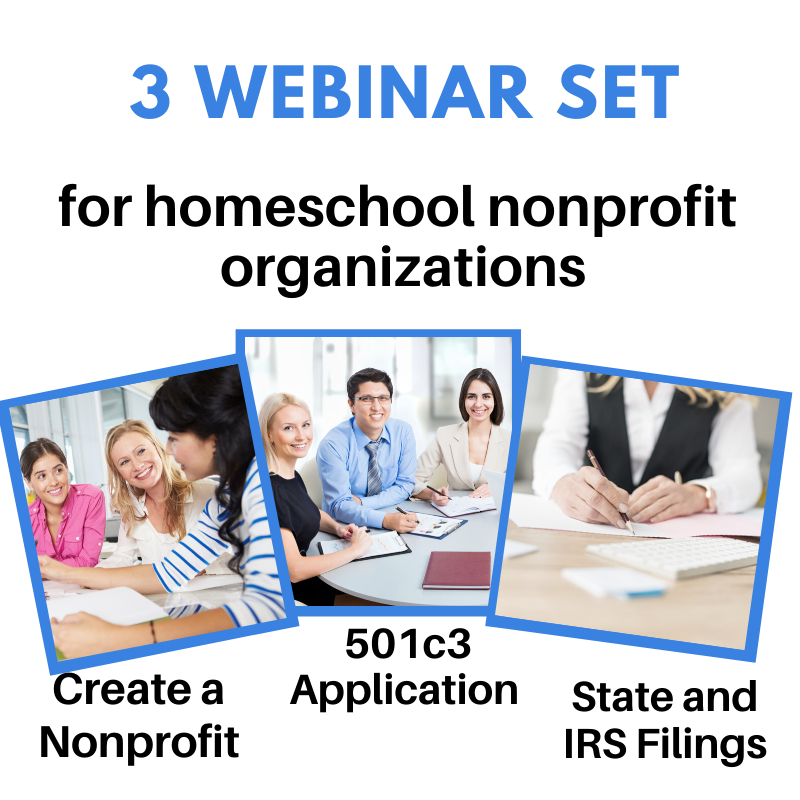
I have spent years helping homeschool groups file for tax exempt status with the IRS.
Most of them are homeschool co-ops and want 501(c)(3) status as a “qualified charity” because they have an educational purpose and desire tax deductible donations, tax -free profits, and sometimes other perks that come with 501(c)(3) status.
But there is another type of tax exempt status that may apply to homeschool support groups: 501(c)(7) Social Club.
Here’s what it takes to be classified as a 501(c)(7) Social Club:
1. Purpose is for pleasure, social or recreation. A nonprofit motive and no part of the net earnings may inure to the benefit of any person having a personal and private interest in the activities of the organization
There must be an established membership of individuals, personal contacts and fellowship. A commingling of the members must play a major role in the life of the organization.
Common examples include college fraternities or sororities, country clubs, garden clubs, hobby clubs, etc.
2. Limited membership: membership is limited and consistent with the character of the club
3. Supported by membership fees. In general, your club should be supported solely by membership fees, dues, and assessments. A section 501(c)(7) organization can receive up to 35% of its gross receipts from sources outside of its membership without losing its tax-exempt status. For example, up to 35% of your total revenues can come from fund raising.
4. Business activities. If your club will engage in business, such as selling products or services, it generally will be denied exemption. However, your organization can provide meals, refreshments, or services related to its exempt purposes only to its own members or their dependents or guests.
5. Tax treatment of donations. Donations to social clubs are not deductible as charitable contributions on the donor’s federal income tax return.
Sources:
https://www.irs.gov/pub/irs-tege/rr58-589.pdf
https://www.irs.gov/publications/p557/ch04.html#en_US_2010_publink1000200325
These criteria fit a homeschool support group. The members are limited to homeschool parents (or those interested in homeschooling), meet for social reasons, are supported by membership fees (and maybe a little bit of fund raisers), do not sell products or services and do not collect tax deductible donations.
So most homeschool support groups can be considered 501(c)(7) Social Clubs.
Most homeschool co-ops do not fit this description because they sell services (classes) and have an educational purpose, not a social or recreational purpose. They may qualify for 501(c)(3) tax exempt status as an educational organization.
Confused about whether your organization is a 501(c)(3) “qualified charity” or 501(c)(7) Social Club?
This chart may help: Compare 501c3 to_501c7
Here’s the good news: If your organization fits the bill to be a 501(c)(7) Social Club, you do not have to file the IRS application (Form 1023 or 1024) like 501(c)(3) organizations must. 501(c)(7)s are allowed to “self-proclaim” their tax exempt status.
Here’s the bad news: The IRS requires all tax exempt organizations to file an annual information return , Form 990/990EZ or 990N. Failure to file the Form 990/990EZ/990N for 3 consecutive years means your tax exempt status is automatically revoked. Need help getting your tax exempt status reinstated? read further here for more help.
If you want to look into getting your homeschool co-op 501(c)(3) status, you can see my homeschool leader books here,

or go to my available webinars for homeschool leaders here.

Carol Topp, CPA
HomeschoolCPA.com

[…] Are Homeschool Support Groups Automatically Tax Exempt … […]
Where in the world did you get the information that a 501(c)(7) is not required to file an annual information return with the IRS? I have been unable to find this information in any IRS publication or instruction. While there are exemptions for filing when gross receipts are regularly below a certain level, no where have a found that an entire code of exempt organization is not required to file by virtue of being organized under that code.
Katia,
I didn’t write that 501(c)(7s) do not file the annual information return (Form 990). They are required to file annual 990s.
I wrote that the IRS does not require 501(c)(7)s to file an application (the Form 1024) to be tax exempt. c7s can “self declare” tax exempt status.
In this post I cite my source from the IRS: https://homeschoolcpa.com/self-proclaimed-tax-exempt-status-for-501c7-social-clubs/
Sorry if the blog post was confusing.
Carol Topp, CPA
P.S. But even if your group does not have to file the application paperwork (Form 1023 or 1024), your organization must still file an annual information return called a Form 990/ 990EZ or the simple on-line Form 990N with the IRS. Read more here: IRS Form 990N FAQ
I have an ethnic organization that filed a 990 and the IRS said it had no record of them as a not for profit. If what you say above is true how do you avoid the IRS notice when you file the 990 if your self-proclaimed 501c7?
George,
Sounds like you filed a 990, but were not in the IRS database as an exempt organization. To get into the IRS exempt organization database you need to call the IRS Customer Account Services at 1-877-829-5500. It typically takes 6 weeks after you call to be added to the IRS database. They will ask for your organization’s legal name, EIN, address and a contact name. They may also ask if you have “organizing documents such as Articles of Incorporation or bylaws.
After you are in the IRS exempt organization database, you can begin filing the Form 990s.
Carol Topp, CPA